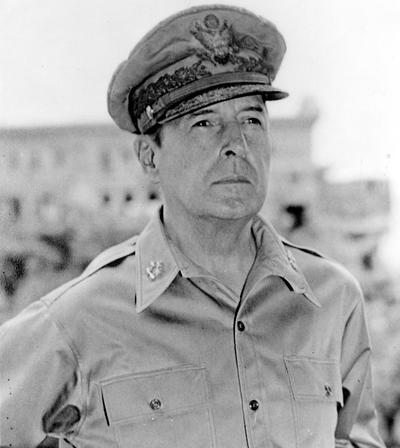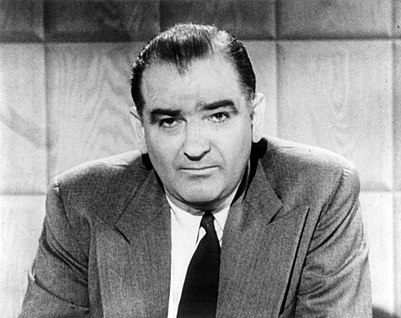Douglas MacArthur
1936-1962
Douglas MacArthur is, in many ways, the founder of modern America.
After the election of the populist Huey Long as president in 1936, General MacArthur, a hero of the Great War, led a coup that removed President Garner and President-elect Long from power. The March on Washington saw many members of Congress, mostly progressive Democrats and Populists, arrested and removed from power, with the predominantly Republican remainder of Congress appointing MacArthur Commander-in-Chief of the Armed Forces of the United States. Like a modern-day Roman dictator, MacArthur was granted near-absolute control over the government for the duration of the civil war between Huey Long Loyalists and MacArthur's supporters. After four long, bloody years, the Treaty of Washington finally brought an end to hostilities on July 4, 1940, with MacArthur maintaining control over the Northern and Western United States, the Pacific territories (including Alaska), and the Panama Canal Zone.
Following the treaty, MacArthur declared that the victory over communism must be fought for, and was reluctant to give up power. The 1940 Presidential Election had been suspended for the war, allowing MacArthur another four years as Acting President before the next presidential election.
President MacArthur authorized the establishment of a permanent border patrol at the Blue-Red border, and maintained a high defense budget. Though he personally sympathized with the Allies in Europe, MacArthur was unable to convince the war-weary American people to assist in defeating the forces of fascism and communism in a war that did not affect them, as America was in no shape to help other countries at this time.
President MacArthur was also popular with the people for his reforms. MacArthur greatly increased benefits for soldiers and war veterans, and instituted a national health care system and increased monthly pensions for all current and retired members of the Armed Forces of the United States. Under MacArthur, the size of the Army nearly doubled, as the benefits attracted many people who had been suffering from the Depression.
Throughout the 1940s, MacArthur increased his own power at home. In 1944, he was reelected unanimously by the Electoral College (many of who were MacArthur appointees) to serve another term as President. The Senate, which was now made almost entirely out of MacArthur Loyalists, became much more powerful in comparison to the House of Representatives. MacArthur was again unanimously reelected by the electors in 1948, 1952, 1956, and 1960.
The government of Blue America was composed of four major parts:
The President was the commander-in-chief of the Armed Forces of the United States. He was also the de facto leader of the National Union Council.
The National Union Council was a de facto third House of Congress, made entirely out of MacArthur Loyalists that were members of the dominant National Union Party. The NUC was the highest authority within the nation.
The Senate had nearly all of the real legislative power. Its members were appointed by the House, but approved by the NUC.
The House of Representatives was still democratically elected, but had no real power other than nominating Senators.
After Blue America had been somewhat rebuilt and recovered in the first half of the 1940s, President MacArthur authorized sending aid to the United Kingdom, one of the few remaining free nations in Europe. He believed that a strong UK would be a valuable ally in the fight against global communism, and hoped to maintain a foothold on the European continent. With American aid, the UK was able to successfully repel an attempted Soviet invasion in 1949.
After 1950, MacArthur remained President, but gradually lost much of his actual power to other government officials who led from behind the scenes. MacArthur died peacefully in his sleep in 1962, after being the face of Blue America for 26 years. In later years, he would be remembered very fondly as one of the greatest leaders in American history.

Huey Long
1937-1951
Like his Blue counterpart Douglas MacArthur, Huey Long is one of the most influential Americans of the 20th century.
Long, the governor-turned-US Senator and virtual dictator of Louisiana, had been a supporter of Franklin D. Roosevelt in the 1932 Presidential Election. However, Roosevelt had been assassinated prior to taking office, and the conservative John Nance Garner had been inaugurated instead. Long split with the Democratic Party once Garner failed to reinvigorate the economy, and formed his own third party, the People's Party. The Populists absorbed many left-wing Democrats (and some Progressive Republicans) as well as far-left socialists and communists. In 1936, Long ran for President as the Populist candidate, and was elected by the House of Representatives due to a hung Electoral College. However, Long was forced to flee South before he was able to take office due to a coup by General Douglas MacArthur.
From his base of operations in Louisiana, Long commanded the Red faction within the Second American Civil War. President Long finally agreed to a ceasefire in the Treaty of Washington in 1940, which left him in control of the Southern United States.
Immediately after assuming control, Long ordered the establishment of an American People's Army, as most of the Armed Forces of the United States had been loyal to MacArthur and remained within Blue America. Long's Red Army lagged far behind MacArthur's professional US Army, but was still a formidable force that, if not entirely capable of fully defending Red America from the US Army, was still able to give the US Army a bloody nose.
After the nation was deemed "safe" from invasion, Long began the process of consolidating his power over all of Red America, just as he had in Louisiana. Long outlawed the Republican Party as a "subversive organization" that answered to MacArthur's regime in Blue America, and used the resources of his office to purge the Democratic Party of any opponents to his rule.
President Long then began implementing his left-wing economy policies. He began nationalizing many industries throughout Red America, including the steel and oil industries, and established a progressive tax as part of his "Share our Wealth" program. He also implemented versions of the late Franklin D. Roosevelt's "New Deal" program. Long's public works program industrialized the primarily rural South and made him popular with many people who had suffered from the Depression.
A staunch isolationist, Long absolutely refused to get involved in the wars in Europe and Asia. Though he sympathized with the Soviet Union, President Long did not assist them in their wars against first the Pact of Steel and then the Allied Forces. He believed that Red America needed everything it had to rebuild and recover, but did call on the people of the Allied nations to rise up against their right-wing governments and aid the Soviet Union.
Long was unanimously reelected by the Electoral College (almost entirely his supporters) in 1944 and 1948. During his reign, Long ruled Red America with an iron fist, ruling as the protector of the people. However, Long died of a heart attack in 1951, just months after accepting military aid from the Soviet Union. While his dictatorial style of ruling had worked for him, it was not effective in determining a successor to Long. American leftists still rank Huey Long as one of the greatest leaders in American history.





